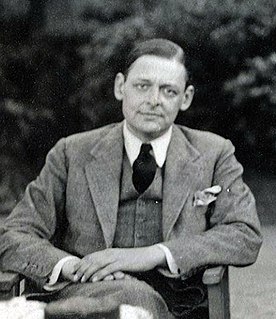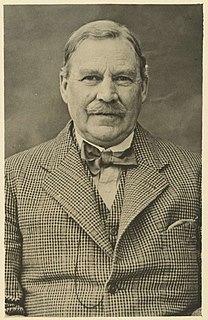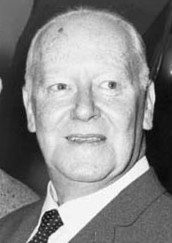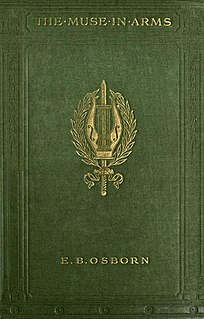Related Research Articles

Thomas Stearns Eliot was a poet, essayist, publisher, playwright, literary critic and editor. Considered one of the 20th century's major poets, he is a central figure in English-language Modernist poetry.

Imagism was a movement in early-20th-century Anglo-American poetry that favored precision of imagery and clear, sharp language. It is considered to be the first organized modernist literary movement in the English language. Imagism is sometimes viewed as "a succession of creative moments" rather than a continuous or sustained period of development. The French academic René Taupin remarked that "it is more accurate to consider Imagism not as a doctrine, nor even as a poetic school, but as the association of a few poets who were for a certain time in agreement on a small number of important principles".
Arthur Johnston (c.1579–1641) was a Scottish poet and physician. He was born in Caskieben near Inverurie in Aberdeenshire. His father, Sir George Johnston, was an Aberdeenshire laird, and his mother Christian Forbes was the daughter of Lord Forbes.

Will H. Ogilvie was a Scottish-Australian narrative poet and horseman, jackaroo, and drover, and described as a quiet-spoken handsome Scot of medium height, with a fair moustache and red complexion. He was also known as Will Ogilvie, by the pen names including 'Glenrowan' and the lesser 'Swingle-Bar', and by his initials, WHO.

Sir John Collings Squire was a British writer, most notable as editor of the London Mercury, a major literary magazine in the interwar period. He antagonised several eminent authors, but attracted a coterie that was dubbed the Squirearchy. He was also a poet and historian, who captained a famous literary cricket-team called the Invalids.

Kenneth Adolphe Slessor was an Australian poet, journalist and official war correspondent in World War II. He was one of Australia's leading poets, notable particularly for the absorption of modernist influences into Australian poetry. The Kenneth Slessor Prize for Poetry is named after him.
Frank Stuart Flint was an English poet and translator who was a prominent member of the Imagist group. Ford Madox Ford called him "one of the greatest men and one of the beautiful spirits of the country".

Alaric Alexander Watts was a British poet and journalist, born in London. His life was dedicated to newspaper creation and editing, and he was seen as a conservative writer. It led him to bankruptcy, when a pension was awarded to him by a friend, Lord Aberdeen.

Arthur Chapman was an early twentieth-century American poet, newspaper columnist and author. He wrote a subgenre of American poetry known as cowboy poetry. His most famous poem was Out Where the West Begins.

Clarence Michael James Stanislaus Dennis, better known as C. J. Dennis, was an Australian poet and journalist known for his best-selling verse novel The Songs of a Sentimental Bloke (1915). Alongside his contemporaries and occasional collaborators Henry Lawson and Banjo Paterson, Dennis helped popularise Australian slang in literature, earning him the title 'the laureate of the larrikin'.

Gilbert Frankau was a popular British novelist. He was known also for verse, including a number of verse novels, and short stories. He was born in London into a Jewish family but was baptised as an Anglican at the age of 13. After education at Eton College, he went into the family cigar business and became managing director on his twenty-first birthday, his father, Arthur Frankau, having died in November 1904. A few months before his death, at sixty-eight, from lung cancer, he converted to Roman Catholicism.
— Wilfred Owen, concluding lines of "Dulce et Decorum est", written 1917, published posthumously this year
Nationality words link to articles with information on the nation's poetry or literature.

Rachel Annand Taylor was a Scottish poet, prominent in the Celtic Revival, and later a biographer and literary critic.
Nationality words link to articles with information on the nation's poetry or literature.
Nationality words link to articles with information on the nation's poetry or literature.

— Opening lines of Rudyard Kipling's White Man's Burden, first published this year

William Stanley Beaumont Braithwaite was an African-American writer, poet, literary critic, anthologist, and publisher. His work as a critic and anthologist was widely praised and important in the development of East Coast poetry styles in the early 20th century.

The Muse in Arms is an anthology of British war poetry published in November 1917 during World War I. It consists of 131 poems by 52 contributors, with the poems divided into fourteen thematic sections. The poets were from all three branches of the armed services, land, sea and air, from a range of ranks and from many parts of the UK. Twenty of the poets who contributed to this volume died during the war. The editor was the journalist and author Edward Bolland Osborn (1867–1938), and the book was printed in London by the publishers John Murray. This anthology was one of several collections of war poetry published in the UK during the war. It "achieved large sales", and was reprinted in February 1918. It has been referenced in several analyses of First World War poetry and has been described as "the most celebrated collection of the war years".

Henry Thomas Mackenzie Bell, commonly known by his pen name Mackenzie Bell, was an English writer, poet and literary critic. He was a writer for many Victorian era publications, most especially the London Academy, and published several volumes of poetry between 1879 and 1893.
References
- 1 2 3 4 "Memorials of the family of Forbes of Forbesfield". National Library of Scotland . p. 29. Retrieved 2 March 2022.
- 1 2 "Deaths". The Times . No. 54935. 22 November 1960. p. 1.
- 1 2 3 4 5 "MAKAR" . Aberdeen Press and Journal . No. 28815. 10 May 1947. p. 2. Retrieved 2 March 2022– via British Newspaper Archive.
- 1 2 "PARNASSUS IN LONDON The Story of the Poets' Club" . The Graphic . No. 2086. 20 November 1909. p. 26. Retrieved 2 March 2022– via British Newspaper Archive.
- ↑ "News and Views of Literary London". New York Times . 7 January 1934. pp. BR8.
- ↑ Pondrom, Cyrena N. (1973). "The Book of the Poets' Club and Pound's "School of Images"". Journal of Modern Literature. 3 (1): 100–102. ISSN 0022-281X. JSTOR 3830893.
- ↑ "THE LONG LANES OF ENGLAND". The Star (Sydney) . 30 April 1910. p. 14. Retrieved 2 March 2022.
- 1 2 "MR SIMPSON'S POEMS" . Aberdeen Press and Journal. No. 17165. 17 January 1910. p. 2. Retrieved 2 March 2022– via British Newspaper Archive.
- ↑ "MISCELLANEOUS". South Australian Register . 9 July 1910. p. 4. Retrieved 2 March 2022.
- ↑ "IN FEBRUARY". New York Times Saturday Review of Books & Art . XV (7): 73. 12 February 1910 – via HathiTrust.
- ↑ "Lovers of poetry will welcome a new volume..." . Illustrated London News . No. 4087. 18 August 1917. p. 25. Retrieved 2 March 2022– via British Newspaper Archive.
- ↑ "THE GOLDEN ROSE AND OTHER POEMS" . The Gentlewoman . No. 1389. 17 February 1917. p. 16. Retrieved 2 March 2022– via British Newspaper Archive.
- ↑ D'Arch Smith, Timothy (2015). The Frankaus : prejudice and principles within a London literary family. [Wilby, Norwich]. p. 179. ISBN 9780859553261. OCLC 1244732303.
- ↑ Swaffer, Hannen (29 June 1958). "The poets' night" . The People . No. 3995. p. 4. Retrieved 2 March 2022– via British Newspaper Archive.